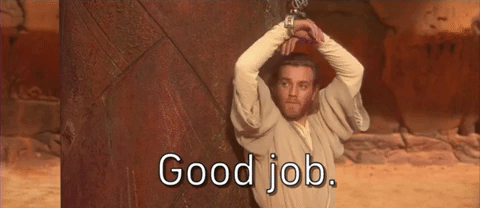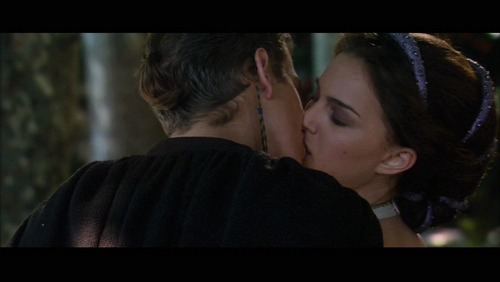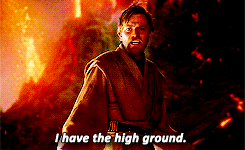Yeah, so I finished my long review on the prequels last week... and was promptly asked for a TLDR version. At first I kinda fumed at the idea. I put in the work, you should put in the work to read, dangit! But as soon as I stopped yelling at the young kids to get off my lawn I realized it was a good idea. A TLDR version allows for ease of access and honestly there were things I had realized after finishing my longer form that I hadn't noticed. For anyone who tells you that Star Wars is a simplistic children's series please remind them that this reviewer is still finding new things after
nine viewings. Simplistic indeed.
Structure
All Star Wars works off of a ring format: it shows an opening scenario, subverts that scenario, and then repeats the scenario with the subversion included as additional information.The individual episodes use this structure and the trilogies use each episode in them as one part on its own.
The Phantom Menace
The Opener

The peaceful planet of Naboo has been having issue with taxes so the Trade Federation puts a blockade around their planet until they pay their bills. Hoping to bypass the clunky Republic Chancellor Valorum sends Jedi Master Qui Gon Jin and his sarcastic apprentice Obi-Wan Kenobi to mediate the dispute secretly, out of the eyes of the corrupt Republic. It does not end well; the Trade Federation is planning an invasion, spurred on by a mysterious man in a black hood! After escaping the Federation Qui Gon and Obi-Wan land on the surface of Naboo, where they come across the secretive Gungans thanks to a hapless (and annoying) outcast named Jar Jar Binks. After hoodwinking the Gungans into giving them a transport Qui Gon, Obi-Wan, and Jar Jar get to the Naboo and beg the naive pacifist Queen Amidala to go to the Senate to make this war public.
Amidala resists at first, but relents and the group escape the planet after their ship's hyperdrive is irrevocably damaged. Short on fuel they land on Tatooine. Amidala disguises herself as the servant girl Padme and goes onto the planet with Qui-Gon Jin (who immediately sees through her disguise) with Jar Jar. After finding out that they don't have the correct currency to buy a new hyperdrive the group meets Anakin Skywalker, a young slave who was conceived by the Force itself.
Impressed by Anakin's Force sensitivity, who has dreams about freeing the slaves (his mother), Qui-Gon bets everything on him and it works: Anakin wins in a race that he's never won before, in a vehicle he never should have been able to build, in a type of race he had no business attempting. At nine. Qui-Gon was able to get Anakin's freedom, but not that of his mother, leaving Anakin with a terrible choice: to leave his mother to become a Jedi or to stay a slave with his mother. He leaves his mother. On the way back to the ship they are attacked by a mysterious man in black with a red lightsaber, who is relentlessly talented. Everyone flies back to Naboo and Anakin begins to miss his mother, although everyone is hopeful that the Senate will be able to sort everything out. Encouraged by Anakin's bravery Padme develops an attachment to the boy five years her senior and he gives her a charm he had made, for luck. An unlikely friendship has been formed.
The Subverter
Turns out there's a good reason why Valorum wanted the dispute settled secretly: the Republic is hopelessly corrupt, bought out by the Trade Federation. Senator Palpatine, whose jawline looks suspiciously like that dude in the black robe from before (Lord Sidious, as he calls himself), convinces Queen Amidala to request a vote of no confidence in Chancellor Valorum as the Senate becomes inevitably bogged down. Senator Palpatine is one of the people nominated to replace Valorum, coincidentally enough. Anakin is presented to the Jedi Council, who, after taking a good hard look at him, tell Qui Gon he will not be trained. Qui Gon, angry at the Council for their lack of respect for the Force, offers to take up Anakin as an apprentice, putting him at odds with Obi-Wan. Queen Amidala, emboldened by Anakin's courage in the race, decides she's going to go fix the war herself because, even with the election of Senator Palpatine, the Republic will not move fast enough for her people.
The Closer
Despite everyone's protests Queen Amidala travels back to Naboo. Using Jar Jar Binks she finds the Gungans and reveals herself as Padme, the servant girl, in a last ditch effort to forge an alliance between her and the Gungans. Flattered by her humility the Gungans agree. But this time the negotiation works, it's not forestalled like it is in the beginning. A plan is made but a wrench is thrown into everything when Darth Maul shows up and pulls away Qui Gon and Obi-Wan into an epic duel (finally getting what he was looking for in the Opener) and Anakin gets pulled into the space battle that's trying to knock out the Trade Federation ship that controls the droid infantryman on the planet. Qui-Gon Jin is killed by Darth Maul after Obi-Wan is separated from his master. But through superior tactics and trickery Padme manages to capture the Viceroy and Anakin manages to accidentally blow up the Trade Federation ship, completely dismantling the Trade Federation's offensive. This creates a ripple in the Force that stuns Darth Maul, allowing Obi-Wan to achieve an impossible leap and cut his foe in half.
The Council decides that Anakin is to be trained, Nute Gunray is taken away to pay for his crimes, and Naboo is restored. But Anakin has lost his Qui-Gon and is instead placed under the care of Obi-Wan, who thinks Anakin dangerous. So Anakin has lost his mother, Padme is going back to being a queen, Qui-Gon is dead, and the dude who's his master severely dislikes him and will only take him on as an apprentice because his old master said so.
What could go wrong??
Attack of the Clones
The Opener
Time has been kind to no one but Obi-Wan Kenobi and Chancellor Palpatine. The Republic is on the verge of falling apart. The Trade Federation escaped all repercussions. Padme, after being the elected monarch of a planet for two terms, overstretched herself by becoming a Senator. Anakin's mother was never freed, which would have been crushing enough, but now he's having dreams of said mother in horrific pain, and Padme never talked to him during those ten years, leaving him in isolation, Palpatine inflating his ego, and if
that wasn't enough, Kenobi is jealous of him and insecure because of Anakin's obvious power! So when Anakin finally sees Padme again it goes about as well as can be expected. She's trying to figure out how to stop the Republic from building and army so that way a full on galactic war doesn't break out, and she sees the little boy that inspired her so much in her.... all grown up. And really attractive. And looking at her as only a nineteen year old emotionally beaten down horndog can (yes, guys, we really can look that creepy). Padme is unsurprisingly not comfortable with any of those feelings, so she attempts to shut out Anakin... which leads to an assassination attempt. Kenobi follows the trail from this attempt to the Outer Rim, to a group of aliens called the Kaminoans, who are cloners. Meanwhile Padme and Anakin escape to Naboo, where the intensity of Padme's sudden attraction and Anakin's ten long years of fantasizing about Padme come to a head. Padme, wisely, tells Anakin they can't go any farther. Anakin, heartbroken, agrees with her.
The Subverter
What Kenobi discovers is beyond shocking:
someone from the Jedi Order had commissioned a clone army right under the Order's nose and nobody noticed. Y'know, ten years ago when everyone was looking at the Naboo incident? The clone army was in its beginning stages
then. This understandably upsets Yoda and Mace Windu, who are trying to figure out how something so epically large could have escaped their notice. Anakin's dreams about his mother have become so bad that Padme volunteers to go to Tatooine with Anakin to see what's going on. What they find shocks Anakin: not only did his mother move on, becoming freed from slavery, but she got married too! Oh, and she's been missing for a month, right around the time Anakin started having his dreams. Anakin tries to save her, but he's too late; Shmi Skywalker dies in his arms. Enraged, Anakin wipes out every last Tusken raider connected with his mother's death, causing such a strong ripple in the Force that Qui-Gon tries to stop him from beyond the grave, an event so unique that Yoda can feel it across an entire
galaxy.
Anakin returns to Padme, disconsolate and lost in his anger and confusion, expecting to be alone. But Padme, who had an entire planet on her shoulders for years and almost lost it to the Trade Federation, is able to sympathize. She too, had felt that level of anger before, and instead of trying to judge her hurt as worse, she shows compassion. This shared moment of darkness connects them and they walk out far stronger for it, subverting their vow to not fall in love. They then receive Obi-Wan's message: he had tracked the bounty hunter who was provided the source DNA for the clones to a planet called Kamino, where he found that his "grand-master", Count Dooku, was planning an attack on the Republic with the Separatist armies. Obi-Wan had been captured and forced to face the Count, who revealed the master plan: Darth Sidious was behind the whole thing. Dooku then offers Obi-Wan a chance to destroy the Sith, once for all. Obi-Wan, in his usual wisdom and grace, refuses.

For whatever reason Anakin and Padme decide to save the goody-two shoes Obi-Wan, much to this writer's eternal consternation. It doesn't work of course and they get captured right alongside him.
The Closer
Padme, seeing that she's about to die with the Trade Federation watching, decides she doesn't want to die alone; she reveals her feelings for Anakin. Shared darkness is a powerful thing and the darkness these two have shared is unlike any other. She and Anakin share a passionate snogging before fighting three creatures with Obi-Wan Kenobi. The Jedi show up but are overwhelmed, but Yoda appears with the clone army that no one in their right mind would accept at any other point in time and the battle turns around. The clones are creative, obedient, and much better fighters than the droid army. It's a foregone conclusion who's going to win. So when Anakin and Obi-Wan see Dooku escaping, they try to capture him. Ten years of hypocrisy and bullying finally come to a head as Anakin refuses to work with Obi-Wan, losing not just the fight, but his arm, Dooku, and starting the Clone Wars. As everyone congratulates each other on the greatest ethical outrage ever Yoda mourns that the battle for the soul of the Republic is already lost. At the same time Anakin and Padme get married secretly, turning them both into liars and betraying whatever dignity and integrity they had left. Instead of doing something for herself, Padme has done what she has always done: try to do something she finds significant without rocking the boat, by lying about how she is. Only now she isn't lying to herself, just to the whole world. She shifts the problem without solving it.
Revenge of the Sith
The Opener
It's three years into The Clone Wars and Count Dooku, along with the cyborg General Grievous, have made a surprise attack on Coruscant, the center of the Republic, and kidnapped the chancellor! While a pitched battle rages over Coruscant Obi-Wan and Anakin sneak aboard the Droid Federation ship Palpatine's been hidden on and try to get him back, in a similar move to the beginning scenario of The Phantom Menace. The duo run into Count Dooku again, and this time they take him together. Obi-Wan is knocked out by Dooku and Anakin is left to fight him alone, again. But this time Anakin is ready and actually able to hold his own. Dooku taunts him, able to pick up on the fear that Anakin has picked up over the last few years. He has a secret wife now, there's much to be afraid for! Anakin's fear snaps into anger and he removes both of Dooku's hands. Palpatine, sitting right in front of the duelists, starts to use the emotional credit he has with Anakin to make him kill Dooku, who loses his head.
After a crash-landing and the return of Palpatine to the politicians Padme tells Anakin the news: she's pregnant, messing things up in a similar way to Jar Jar in She's scared, but Anakin is excited: they're parents! He promises Padme that their troubled marriage can be fixed. All will be well again. But the drawing close of the war only seems to introduce more complications. Palpatine wants Anakin to sit on the Council. The Council accepts, but only to have Anakin spy on Palpatine for them. Anakin is enraged by this after denying him the rank of Master.
Anakin begins having nightmares of Padme dying in childbirth. His dreams have completely turned from hope in The Phantom Menace to despair and loss. So Anakin goes to Yoda for help. Yoda, knowing that there is life after death, screens Anakin, trying to figure out if he'll tell him the truth; Anakin declines. So Yoda simply tells Anakin to let go of what he's afraid to lose. It's too little, too late. Anakin couldn't pass the test when he was nine and he can't pass it here, either.
The Subverter
Palpatine lays his trap. He calls Anakin to his side: General Grievous has been found in the Utapau system and he wants Anakin to lead the assault! He then reveals the Tragedy of Darth Plageuis the Wise, a Sith who was supposedly able to create life by directly influencing the midi-cholorians, thus insinuating that Anakin is a creation of evil. He then reveals to Anakin that Plagueis could stop those he loved from dying, and that this knowledge could not be learned from a Jedi. Padme, during her alone time with Anakin, asks him to talk to Palpatine to stop the war. Anakin, feeling cornered, lashes out, causing Padme to ask to help him, somehow. Anakin refuses to let her in, however; he's got too much to think about and won't let Padme know what it is. Palpatine's emotional manipulations are almost complete.
Anakin relays the news that Palpatine had given him: General Grievous has been spotted and the Chancellor requests that Anakin lead the charge. The Council disagrees and decides to send Obi-Wan instead. Anakin sees Obi-Wan off, bidding his only friend in the Council good-bye. He then goes to Palpatine to tell him how disappointed he is that he wasn't even sent with Obi-Wan. Palpatine reveals that he's the Sith Lord the council's been looking for. He tells Anakin that he knows about the danger Padme's in and begs to help. Anakin runs off to tell the Council that Palpatine's the Sith Lord.
The Closer
Anakin reveals to Mace Windu that Palpatine is the Sith Lord. Windu runs off to arrest the chancellor, telling Anakin to stay put, to "stay in your cockpit". Anakin, unsure of whether they're going to kill Palpatine or not, rushes off to make sure Palpatine lives. And, sure enough, he finds Windu standing over a defeated Palpatine, saying that Palpatine is too dangerous to be left alive. Backed into a corner, Anakin pleads with Windu, begging to at least let him go to trial, that he needs Palpatine to save Padme's life. In the end Anakin disarms Windu and Palpatine blasts him out into the skies. Lord Sidious stands up, revealed in all his horrific glory. Anakin is given a new name: Darth Vader. Vader is dispatched to the Jedi Temple to kill every single Jedi, regardless of age, while Palpatine executes Order 66, doing a perverted version of the destruction of the Trade Federation ship from before.
The children are slaughtered by Anakin as part of the butchering of his own soul and the Jedi out and abroad are killed by the Clone troopers they had grown to trust. Obi-Wan, triumphant from his battle with Grievous, barely escapes. Yoda, meanwhile, feels this shift in the Force, as so many people connected to him die violent deaths. Like Darth Maul, Yoda is temporarily incapacitated by the sudden shift. Unlike Maul, however, Yoda brings himself back in time to kill the clone troopers who were about to do him in. Yoda flees back to Coruscant, picking up Obi-Wan along the way. They go to the Jedi Temple to undo a signal that's pulling any surviving Jedi back to Coruscant to their deaths. While there Yoda and Obi-Wan discover the awful truth: Anakin has become Darth Vader. Yoda fills Obi-Wan's head with a bunch of nonsense about how Anakin is gone now and Obi-Wan buys it, flying off to Mustafar after tricking Padme into going to him.
What follows is the single most heartbreaking conversation in Star Wars: the falling out of Anakin and Padme. Padme is finally willing to tell the truth like she has in every third act of every prequel movie but Anakin is so drunk off of power that he won't listen to her. He's unbalanced and irrational, driven wild by his slaughter of the Trade Federation and the innocents. But Obi-Wan shows up, completely shutting down the conversation and derailing Padme, only being slightly less helpful to her as he was to Qui-Gon. This causes Anakin to freak out and Force Choke Padme into unconsciousness. Obi-Wan, blissfully unaware of how he just ruined everything
again, fights and defeats Anakin by manipulating him into making an impossible jump and cuts off all Anakin's remaining limbs, causing Anakin to slide down near a river of lava. Watching Anakin burning and suffocating on toxic fumes Obi-Wan does the clearly rational thing: to yell at Anakin as he burns to death, telling him how he loved him and feeding a line of garbage so clearly irrelevant that Anakin refuses to even pretend to accept it. So Obi-Wan, possessing his usual moral clarity, leaves Anakin to die a horrible death, taking his former pupil's lightsaber as a memento of his failures.
Palpatine, who had narrowly escaped his fight with Yoda, comes and gets Anakin, who somehow survived. Meanwhile, Padme's dying. As Anakin is fitting into a walking iron lung to do deal with the permanent skin and lung damage, at death's door. Padme gives birth to their twins: Luke and Leia. She then gives up her life to Anakin, allowing him to live in the hope that he can be saved. The twins are passed onto their respective guardians as Yoda reveals that, thanks to Qui-Gon, he has learned that there is indeed life after death. There is hope.
For anyone here wanting me to explain the meaning of the prequels, I tell you to look within yourself. Mythology is only the blueprint. You are the building.





















